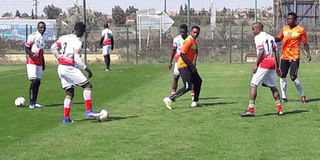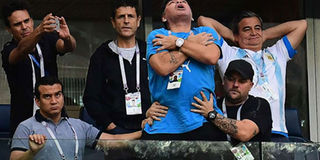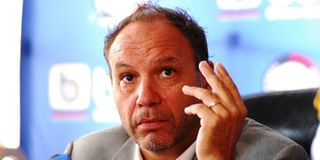Migne may have scored an own goal with his choice of goalkeepers
What you need to know:
- Migne has his work cut out for him. I am glad I am not in his shoes.
Either Sebastien Migne knows something we don’t or he has started his 2019 Africa Cup of Nations (Afcon) campaign with an own goal. It is true that all goalkeepers concede goals but it is also true that some came by their first choice places when we were catching a nap. When it mattered, they demonstrated an unnerving tendency to perform their gatekeeping duties only after their nets had already taken custody of the ball.
Since his announcement of the team that will represent us in Egypt next month, Migne has heard an earful from people who should know. Their beef is his choice of goalkeepers. The facts are on the side of his critics but then again, Migne, whose curriculum vitae needs no embellishment to draw a respectful nod, may pull a surprise when the competition gets going. The odds are long, but don’t rule him out just yet.

Harambee Stars goalkeepers Patrick Matasi (right) and John Oyemba (third right) train with teammates in Marrakech on March 22, 2018 in preparation for their international friendly matches against Comoros and Central Africa Republic. PHOTO | DAVID KWALIMWA |
In fact, this botched goalkeeper episode, for this is how many people see it, is an excellent opportunity to remind ourselves of instances when coaches were right and the rest of us were wrong.
None of us knows what is going to happen when the Egypt proceedings begin except that at the end of it all, either we shall be escorting Migne to the gallows or we shall be crowing around him the way the football-mad people of Argentina did Cesar Luis Menotti in 1978.
'OUTSPOKEN'
This is what happened then. Menotti was coach of the Argentina national team from 1974 to 1983. He was an outspoken, chain-smoking left-wing intellectual who repeatedly poked his fingers into the eyes of the brutal fascist military junta that ruled Argentina then, probably secure in the knowledge that for as long as he kept delivering good football results, the despots who made thousands of people disappear wouldn’t dare touch him. Football meant, and still means, that much to Argentines.
After taking charge of Argentina, Menotti patiently built a strong, cohesive team whose hallmark was free-flowing attacking football even if with pronounced rough edges as repeatedly demonstrated by his hard man of a captain, Daniel Passarella whose elbow dug into many a forwards ribs. As Argentina prepared for the 1978 Fifa World Cup on home soil, a prodigy named Diego Maradona burst into the scene. Not since Pele had the world seen such stupendous talent, pure art in motion.
At age 16, Menotti briefly gave Maradona a place in the national team and the teenager acquitted himself well. He was 17 when the World Cup came around but to everybody’s shock, Menotti left him out of the team. Nobody could believe it. From the moment the announcement was made, Menotti heard from everybody – from journalists, politicians, clergy, businesspeople, fans and, of course, the junta.
They all wanted Maradona in the team. But Menotti stuck to his guns. What impudence was this, the people asked. Had this opinionated tactician become too big for his own boots? When the military rulers, for this once reading from the same page as the people they were terrorising asked Menotti to reconsider, he reminded them who the boss was. And it was not them.
And so Argentina went into their World Cup without the player who was on everybody’s lips. And then, as Auma Obama would say, life happened. With an attack spearheaded by one of the world’s most memorable strikers in Mario Kempes, Argentina cruised to the final where they overcame the stubborn resistance of the Netherlands 3-1 in extra time. They were world champions for the first time and their fanatical fans went crazy with delight.
As the dust began to settle, people asked Menotti why he had, against all counsel, decided to do without Maradona. Now it was the coach’s turn to be listened to. He said that Maradona was a young genius with a bright future but introducing him at a stage when the rest of the team was functioning as a well-maintained machine could have had unpredictable consequences. His contribution could have been positive or disruptive, who knew? But, crucially, why take the chance? In other words, if Menotti was an American, he would have been asking his compatriots: “Why fix it if it ain’t broke?”
Maradona is reported to have never forgiven Menotti for the snub but the coach got the result he and Argentina wanted. But that is the lesson: coaches quite often know something we don’t and despite our deepest misgivings, we are called upon to give them the benefit of doubt, especially if they have a track record we can respect. After all, we still own the chopping boards from where we can take out their heads when things go awry.

Former Argentina forward Diego Maradona (centre) celebrates the opening goal during their 2018 World Cup Group D match against Nigeria at the Saint Petersburg Stadium in Saint Petersburg on June 26, 2018. PHOTO | GIUSEPPE CACACE |
**** **** ****
I am exactly as old as the Nation Media Group – 60 years. Ok, remove the word exactly because I’ve stretched the truth a bit. NMG and I were born in the same year, 1959, but NMG has just celebrated its 60th birthday with fireworks and cake while I am still plotting how I will celebrate mine in October.
Inshallah, as I love to say even if I am not Muslim. The Africa Cup of Nations is a mere two years older than NMG and me, so basically we are age mates – again, testing the elasticity of the truth.
I want to appreciate this long and eventful journey in the coming weeks with stories about Afcon through its 62 years. I have lived them – almost. I can certainly remember when Nigeria were called the Green Eagles and Zambia went by the name KK Eleven. I can recall Black Africa’s battles with Apartheid South Africa which, ironically, is one of the founding members of the Confederation of Africa Football. South Africa did its bit to found Caf and was promptly shown the door because of its racial segregation policies and never returned until Nelson Mandela and his ANC swept to power in 1994.
The Rainbow Nation paid the continent in kind when it won the 1996 Afcon – its first attempt after its readmission. And it loudly demonstrated its place as Africa’s economic superpower when it became the first and so far only African nation to host the Fifa World Cup in 2010.
Some of Afcon’s stories are very nice, while others come with pain that you feel in the marrow. The loss of the entire Zambian national team at sea off Libreville in Gabon in 1993, the second place finish by its hastily assembled successor team in the 1994 Afcon and the country’s eventual triumph in 2012 just a few kilometres from the spot where the 1993 team died makes for one of the post poignant episodes in African football. It is a story that will never die for as long as football is played.

Zambia players celebrate winning the 2012 Africa Cup of Nations. PHOTO | FILE |
I have mixed feelings about Kenya’s return to Afcon after a 15 year break. On the one hand it is a good development. But on the other, it is a story written on a massive billboard for all of us to read about how far backwards we have come.
Football, like life in general, has incurable optimists and I sometimes find myself straying into that space. But there is optimism and there is cold realism. We have been pooled together with Senegal and Algeria and to some people, this means that Harambee Stars’ travel agents are among those who can’t afford to go off-duty after the group stages because they will have outbound flights to book.
It sounds quite mean but it is coming from somewhere. Sadly, it wasn’t always like this. Forty seven years ago, we were not underdogs but contenders. In the calculations of most pundits, the eight nations that participated in the eighth edition of the tournament in Douala and Yaoundé in Cameroon had almost equal chances of taking the Cup home – and the results attested to it.
Kenya played in Group A, which featured hosts Cameroon, Mali and Togo. The other group had Zaire (currently DR Congo), Morocco, holders Sudan and Congo-Brazzaville.
In the opening game of the tournament, Cameroon just managed a 2-1 win over the future Harambee Stars in a game whose most fair result should have been a draw. Kenya’s goal was scored by Jonathan Niva, its player/coach who evidently could play in any position on the field, save for goalkeeper, and win the man-of-the-match award. Kenya drew its next games, with Mali and Togo, 1-1 apiece. It was the 1-1 draw between Mali and Cameroon that knocked out Kenya.
Had Mali, who drew all their matches, beaten Cameroon, there would have been a play-off between them and Kenya. As it turned out, Cameroon and Mali went through, Kenya finished third and Togo brought up the rear in the group.
In the end, Mali went on to the final where they lost to Congo-Brazzaville and Cameroon beat Zaire for the third place slot. Kenya got the Fair Play Award for being the most disciplined team in the competition.
All the teams mentioned above have since opened such a massive gap between themselves and us that we have practically no hope. The fortunes of the national team will in all probability reflect the ever dwindling prospects of our clubs who reached continental finals – in 1979, 1987 and 1994 – but who are now just warm-up partners for the big boys from North and West Africa. Getting to the quarters of even the lower tier competitions for us now is a magical experience. The trajectory downwards can sometimes be quite steep.
I like Migne. I think he is the best bet we have in a long, long time. I hope he has not tripped over himself in his choice of goalkeepers. But he is coach of Kenya, a country that would easily collect gold in any world corruption championships if ever there were some. Mediocrity also comes as standard in these shores. And so does lack of vision. Migne has his work cut out for him. I am glad I am not in his shoes.

Harambee Stars coach Sebastien Migne gestures as he names the provisional squad for the 2019 Africa Cup of Nations at the Goal Project in Kasarani on May 14, 2019. PHOTO | CHRIS OMOLLO |





